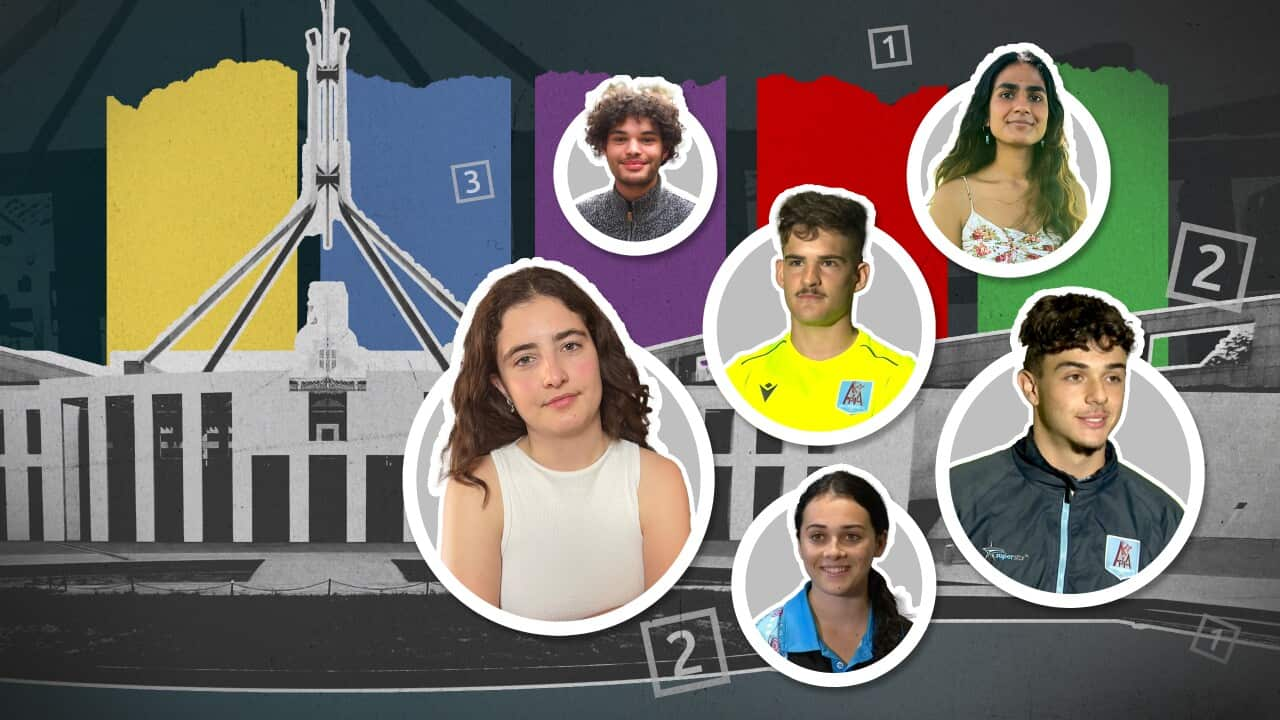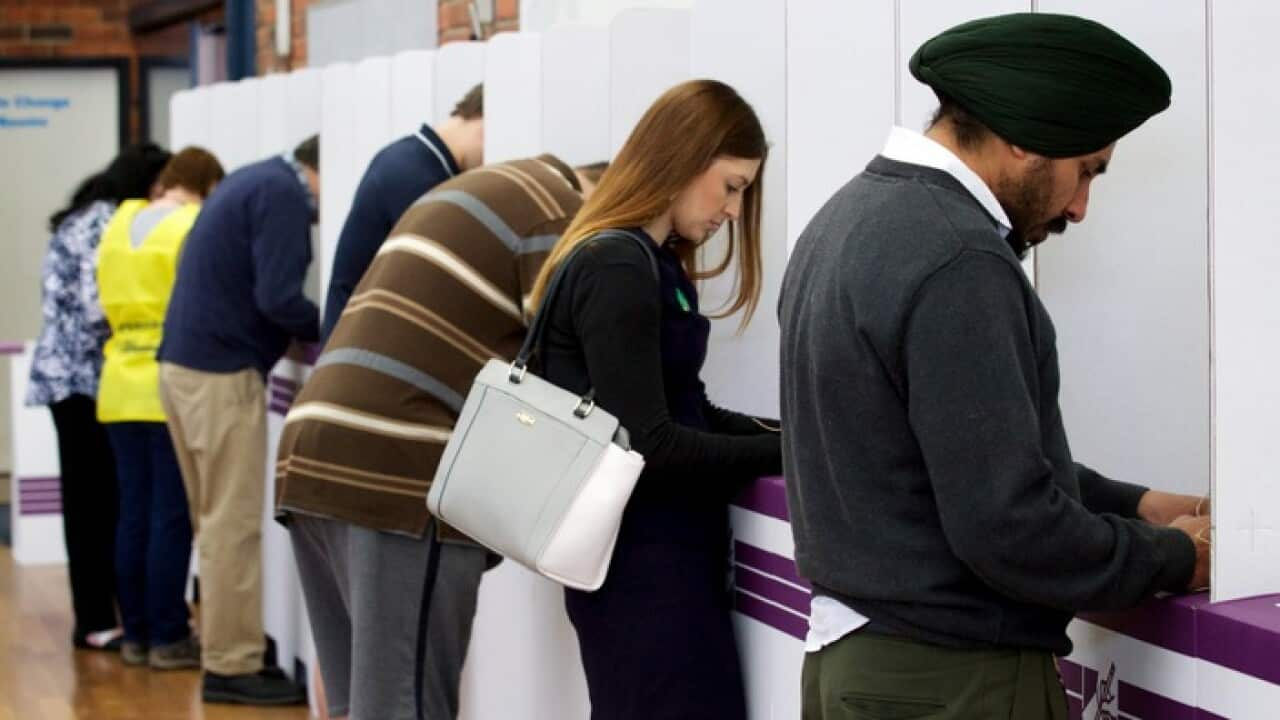Since the last federal election in 2019, hundreds of thousands of Australians have reached the eligible voting age of 18.
In three years marked by a global pandemic and natural disasters reaching nearly all corners of the country, there is no shortage of issues to take to the ballot box.
Varsha Yajman, 19, has been an organiser with the School Strike 4 Climate movement, and now works as a paralegal in Sydney.

Varsha Yajman says action on climate change will influence how she votes. Credit: SBS
“It feels like so much of the burden is on us to make the ‘right choice’ that is going to give us a safe future.”
But on a football pitch in Sydney’s inner west, the passion for politics isn't as pronounced.
Sebastian Boffa, 18, says his knowledge of politics is limited to the Liberal and Labor parties.
“Maybe I’ll go for the Liberals. I don’t know, I just listen to my parents. I’m not too sure about the specifics,” he says.

Sebastian Boffa at a training session in Sydney. Credit: SBS
“Being 18 now, it is a requirement to vote, so having an understanding will be important.”
His teammate Gene Marantos is 19. He says most of what he knows about politics has come from social media.
“I’ll probably end up making my decision based on what I’m seeing on the internet at the time,” he says.

Gene Marantos says his knowledge of politics mostly comes from the internet. Credit: SBS
The survey of 2,344 people found leading turnoffs included a politician spreading misinformation or disinformation online (80 per cent) participating in online fights (53 per cent) and a politician criticising their opponent on social media (30 per cent).
Behaviours that would encourage people to vote for a politician included encouraging informed and civic debate (30 per cent), demonstrating community impact (29 per cent), and responding to constituents’ requests for help (16 per cent).
Further south, in Sydney’s Sutherland Shire, is the Kurranulla Aboriginal Corporation. The drop-in centre for locals relies on the help of youth workers including 19-year-old Tameika Lee Fitzgerald.
Asked about her views on politics she says: “I do hear a lot of negativity around Scott Morrison, but I don’t really tune in”.
When it comes to key issues, she thinks more can be done across the board to help young people in Australia.
“I think there could be more to do with youth around Australia, whether that be Indigenous or not. I do tend to think politicians focus more on middle-aged people rather than the youth.”

Tameika Lee Fitzgerald wants more to be done for young people. Credit: SBS
She watched the federal government condemn Russia over its invasion of Ukraine and says she feels disappointed it has not done the same over the war in Tigray (a region in Ethiopia).
“I do wish that in the future, whichever party does win the election really condemns the Ethiopian government for what’s happening in Tigray.”
“It’s been done with Ukraine within a matter of 24 hours but with Tigray it’s been over 500 days.”
Minister for Foreign Affairs Marise Payne released a statement in October condemning ongoing fighting in the region. the following month.

Noha Tsehaye (centre) at a rally in Perth. Credit: Supplied
“We’re a mixed-race people. Our ancestry is rooted in the southwestern cape of Africa, so I have particular concern of Indigenous issues,” he says.
As well as climate policies and education, Liam also sees housing as an important issue in the upcoming election.
“It would be very important to me, that whoever takes up government, addresses the increasing inflation of housing prices and rent.”

Liam Weber thinks housing is an important election issue. Credit: SBS
Among them was first-time voter Rory, who was disappointed with the rising costs of arts degrees:
“It shouldn’t be the case that people are forced to choose career paths just for economic reasons. It should be that you study want you want to study.”
The Australian Electoral Commission has been urging young voters to enrol as soon as possible to ensure they’re eligible to vote in the upcoming election.
From the end of February, there were approximately 612,300 Australians enrolled to vote who were aged 18,19, or 20.
Dr Jill Sheppard is a senior lecturer in politics at the Australian National University. and says Australia’s system of compulsory voting means mainstream parties are risk-averse and tend to avoid engaging first-time voters.
“I think it’s the easiest job in the world for the parties to engage younger people more than they’re doing now, because, at the moment, they’re frankly doing nothing, " she says.
“They need to speak to younger people on terms that appeal to them, like climate change, access to education, and the problems faced by renters … These are issues that the major parties seem scared to talk about because they will put off older voters.”
A Coalition spokesperson said the Morrison government continues to support young people "now and into the future".
"While the Morrison government creates a stronger future for the next generation of Australians, a Labor-Greens government will continue to flip flop on issues that matter most to young people."
A Labor Party spokesperson said young Australians risk being the first generation in the nation’s history to be worse off than those before them.
“Unlike the Morrison Government, Labor is committed to providing young Australians with strong and formalised engagement in government and policy making.”
Greens leader Adam Bandt said his party's strongest support comes from young people.
"Liberal and Labor are ignoring young people, and more and more, young people are ignoring them."
Back in Sydney, 19-year-old politics and economics student Niamh O’Connor Smith says while she's excited to be voting for the first time, she's worried about the result.
“I don’t want to think about the result of the election,” she says.
“It scares me a lot, but I know that no matter what the result is, I’m still going to fight and organise for climate and economic justice.”
People have until 8pm on Monday 18 April to enrol to vote in the election.
Would you like to share your story with SBS News? Email











